To be honest, whenever it comes to the penis, it seems to revolve around
size, thickness, and length
But when it comes to “functionality”
nothing is more important than hardness
From the perspective of satisfaction with PAPAPA,
whether the penis can “stand up”
greatly affects the “user experience”.

But, as the saying goes,
“If everyone has no problems,
then what do we need doctors for?”
Because some friends
really struggle to “stand up”.
For example,
those with severe erectile dysfunction (impotence),
congenital penile developmental abnormalities,
those suffering from tumors and other diseases,
or those who have experienced accidental injuries,
like when too much force
causes the penis to break…

For the “sexual happiness” of these friends,
medical professionals and scientists have been racking their brains.
Recently, a study led by Professor An Geng’s team at the Reproductive Medicine Center of the Third Affiliated Hospital of Guangzhou Medical University
has achieved the world’s first research
utilizing stem cells + 3D printing technology
to potentially allow damaged and dysfunctional penises
to “regenerate and repair”!
What’s going on? Let’s find out…

Whether it can “stand up” depends on this
Experienced individuals know that for the penis to be in a state of readiness, it relies on the corpora cavernosa. The penis is primarily composed of three cylindrical structures—two corpora cavernosa and one corpus spongiosum.
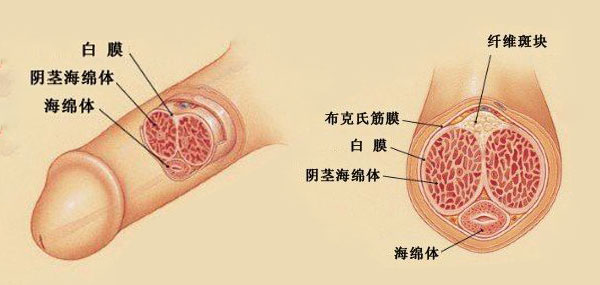
▲Don’t be shy, let’s get to know the penis
The corpora cavernosa act like a “sponge”; when stimulated they become engorged and erect, while at other times, blood flows back, returning to a “calm” state. Engorgement, flaccidity, and maintaining hardness are the unique “qualities” of the corpora cavernosa, which anyone who uses them knows~

But like all precious things, once the corpora cavernosa are damaged, repairing them becomes complicated!
“The corpora cavernosa are a ‘porous structure’; once broken or ruptured, surgical suturing is very difficult,” Professor An Geng from the Reproductive Medicine Center explains: “Clinically, patients with corpora cavernosa damage, even after various penile reconstruction surgeries, find it very hard to restore erectile function and reproductive ability to their original state.”

If suturing doesn’t work, what about finding a replacement?
For those with severe erectile dysfunction, in the past, implanting a prosthesis inside the penis became the last resort.
A qualified penile prosthesis should mimic the special functions of the penis as closely as possible—able to become erect and flaccid, maintaining flexibility and adaptability… (This description makes it sound quite cute!)

Thus, someone invented this amazing—“triple set”: a hydraulic expandable prosthesis, implanted in the corpora cavernosa, scrotum, and the space in front of the bladder.
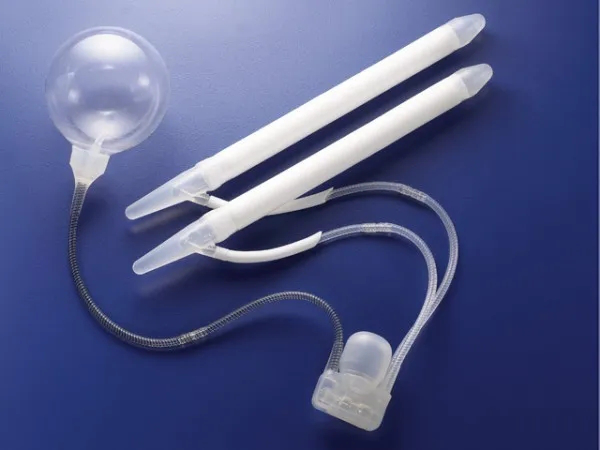
Hydraulic expandable prosthesis
As for how to use it?
Feel free to brainstorm in the comments section
to see who can guess it right!

Back to the point! After all, it’s a prosthesis, not the “original”, and the material differs significantly from real corpora cavernosa, and there are certain risks involved in its use.
Moreover, the price seems a bit “off-putting” (just the materials cost around 150,000 yuan).

Of course, besides implanting prostheses, there is a rather bold approach, such as using a “second-hand” one, taking someone else’s!
Believe it or not, there really are cases! In 2014, the world’s first penile transplant in Africa sparked heated discussions; in 2018, the first complete penile and scrotal (excluding testicles) transplant surgery was successfully performed in the United States.
However, “allogeneic” transplantation is ethically controversial, with limited sources, risks of immune rejection, and psychological issues.
After all, using someone else’s penis,
you need to be quite mentally strong~

Neither of these options is feasible, but the demand for repairing damaged corpora cavernosa is significant.
After all, various congenital developmental abnormalities, penile cancer, and accidents leading to “loss of the penis” severely affect sexual and reproductive functions.
The mission to “revive masculinity” is a long and arduous one…

World’s First! Stem Cells + 3D Printing
Allowing Regeneration and Repair of Damaged Corpora Cavernosa
Where there is a problem, there is a solution!
In recent years, with the rise of 3D printing technology, some researchers have wondered if it is possible to use 3D printing technology to reconstruct the corpora cavernosa, “printing” an identical corpora cavernosa?

“Reconstructing hard tissues like bones and teeth is not difficult, but reconstructing soft tissues like corpora cavernosa is not easy,” Professor An Geng explains: “Especially for soft tissues like corpora cavernosa that can contract and rebound, which have special mechanical properties.”
But researchers are not afraid of challenges!
To this end, Professor An Geng from the Reproductive Medicine Center of the Third Affiliated Hospital of Guangzhou Medical University collaborated with Professor Shi Xuetao from South China University of Technology, Professor Mao Chuanbin from the University of Oklahoma, and others to jointly develop a biomimetic 3D printed hydrogel scaffold with a multi-scale porous structure.
In simpler terms, the researchers used special materials to “print” a biomaterial that matches the structure and mechanics of natural corpora cavernosa based on the “porous” structure of the corpora cavernosa.
The researchers also conducted compression tests and cyclic compression tests on the hydrogel scaffold, and after 20 cycles of compression testing (with experimental stress of 40 kPa, greater than the pressure increase range within the tunica albuginea during male erection), it maintained its original mechanical properties without any damage.
In layman’s terms: this 3D printed hydrogel scaffold material can contract and rebound like natural corpora cavernosa, without worrying about its performance, and it won’t break no matter how many times it’s used.

Since the corpora cavernosa are densely packed with microvessels, the reconstruction of the microvascular system plays a crucial role in restoring the function of the corpora cavernosa (erection and ejaculation).
“If repairing the corpora cavernosa is like ‘building a house’, then the 3D printed hydrogel scaffold is the ‘framework’ of the house, and the reconstruction of the microvascular system is the ‘bricks and tiles’ of the house,” Professor An explains.
To achieve this, the researchers utilized stem cell technology, implanting muscle-derived stem cells (MDSCs) with high expression of hypoxia-inducible factor (HIF-1α) into the scaffold, and through layer-by-layer assembly of heparin and poly-L-lysine (PLL), deposited heparin onto the 3D printed hydrogel scaffold to stimulate blood vessel formation at the implantation site, creating a bioengineered vascularized corpora cavernosa.
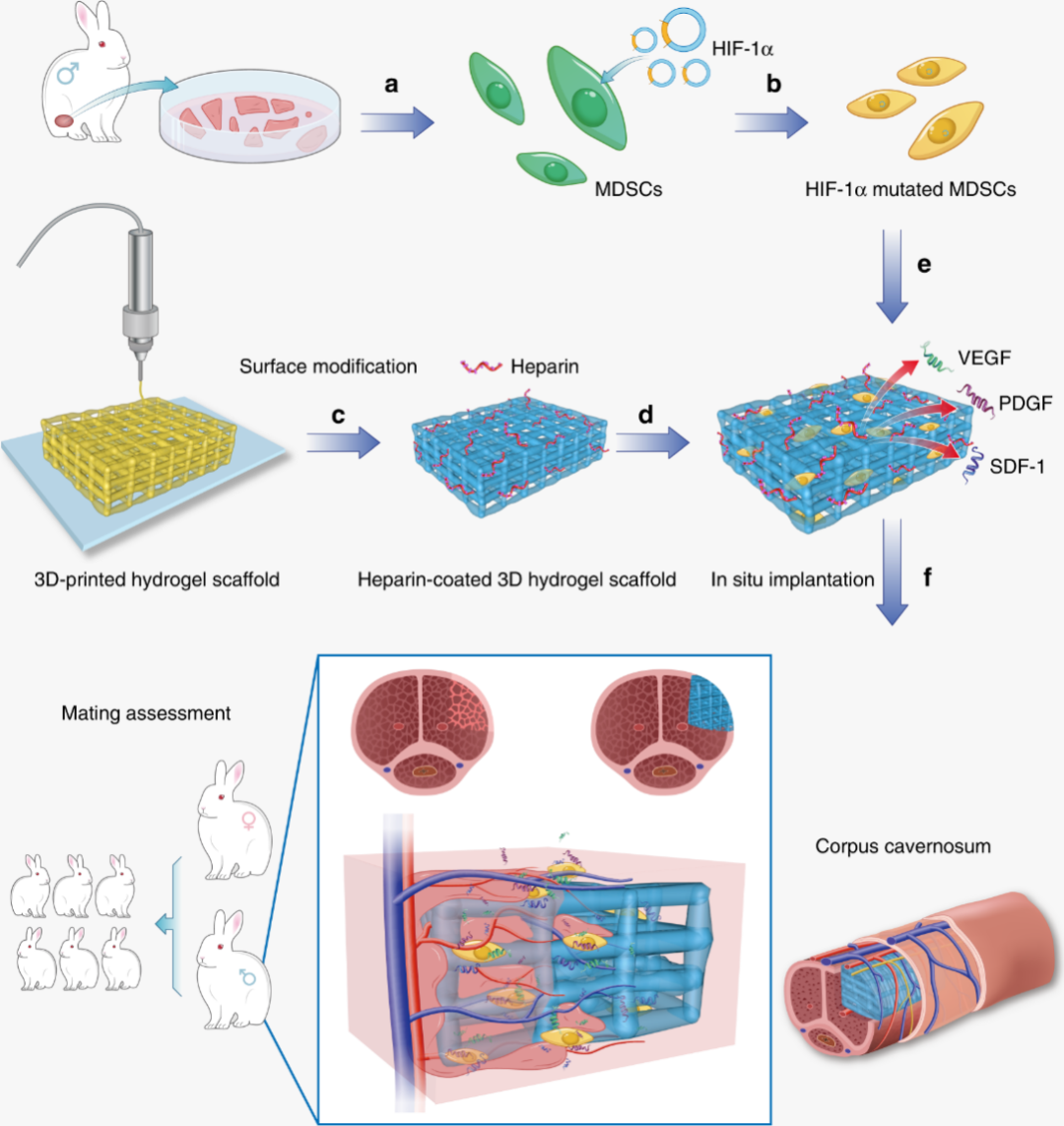
Here’s a schematic of the experiment
Experiments on Male Rabbits! After Repair
Not only did it stand up, but it also produced baby rabbits
Does this special
“bioengineered vascularized corpora cavernosa”
actually work?
Only testing can tell!
To this end,
the researchers first did something—
they operated on rabbits
and… castrated the male rabbits.
The researchers excised part of the corpora cavernosa from the male rabbits.

Subsequently, the researchers implanted this “bioengineered vascularized corpora cavernosa” into the defect of the male rabbit’s corpora cavernosa.
Miraculously,
it
worked!
3D printed biological scaffolds showed good tissue compatibility, with no immune rejection reactions. The new blood vessels induced from the hydrogel scaffold effectively repaired the damaged areas of the corpora cavernosa and promoted the formation of new blood vessels, ultimately repairing the damaged corpora cavernosa tissue in the male rabbit.
After verification, the repaired corpora cavernosa exhibited excellent tissue elasticity and contraction ability, and the male rabbit’s penis had no issues with “erection and ejaculation”, ensuring the rabbit’s “sexual happiness”!
But that’s not all! The researchers mixed the male rabbits that underwent corpora cavernosa repair with female rabbits,
and within 4 months, they continuously gave birth to baby rabbits (note: continuously! How affectionate they are), further confirmingthe restoration of physiological function and reproductive ability, completing the reproduction of offspring.
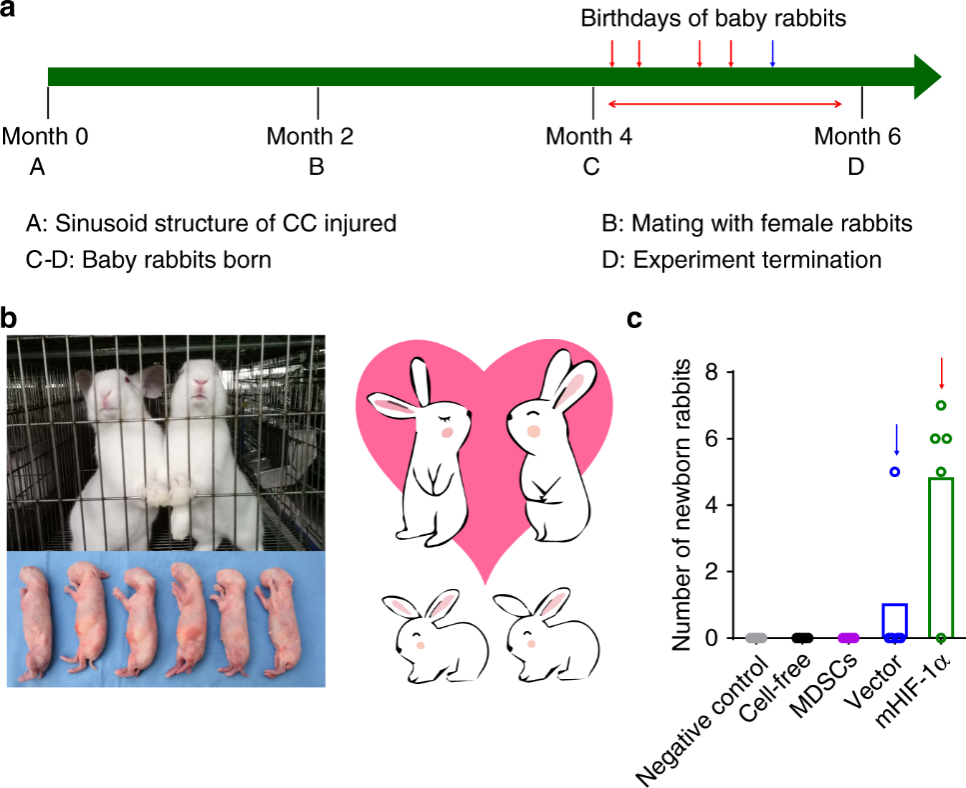
After the repair of the male rabbit’s corpora cavernosa damage, it successfully mated with a female rabbit to produce baby rabbits
(the posing of the two rabbits deserves full marks!)
Check out this video for more details~
This research is the world’s first successful repair of corpora cavernosa defects using stem cells and 3D printing technology, restoring erection and ejaculation functions in rabbits, and restoring reproductive ability and offspring production.
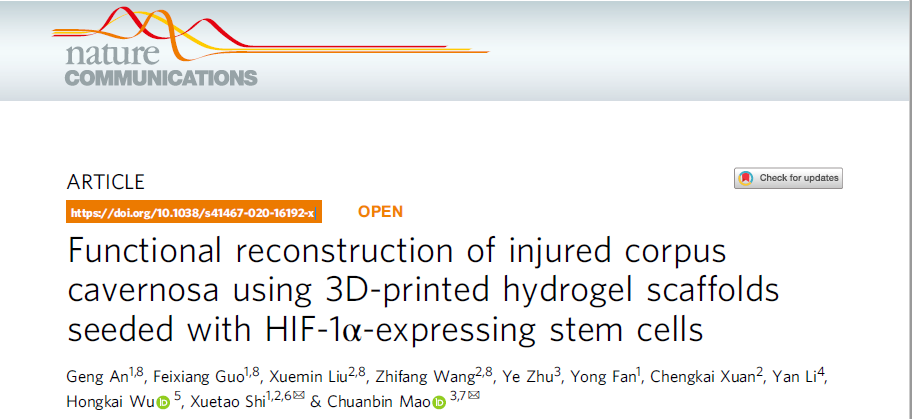
▲The research results were published on June 1 in the international journal “Nature Communications”.

When will it be applicable to humans?
Expected to be applied clinically within the next decade
Benefiting men’s “sexual happiness”!
“Congenital developmental abnormalities of the male reproductive organ account for 5% of the male population, while the prevalence of erectile dysfunction in men over 40 in China is as high as 40%,” Professor An Geng stated: “Repairing the corpora cavernosa is of great significance for restoring male reproductive ability.”
As the head of the male department at the Reproductive Medicine Center of the Third Affiliated Hospital of Guangzhou Medical University, Professor An Geng has seen many men lose their sexual and reproductive abilities due to damage to the corpora cavernosa.
“For vascular erectile dysfunction, this repair strategy is also of great significance,”Professor An Geng said: “In the past, these patients could only replace prostheses, but with this method, we can repair the damage to the corpora cavernosa caused by vascular diseases, promote the growth of new blood vessels, and thus treat vascular erectile dysfunction, allowing these individuals to regain erectile function.”

It can be said that the repair strategy of stem cells + 3D printing technology has very important clinical application value for the reconstruction of corpora cavernosa and the restoration of male reproductive ability.
“Currently, it is still in the animal testing stage, we hope to apply it clinically within the next decade to truly help those with penile deformities, developmental abnormalities, and damage to the corpora cavernosa,” Professor An Geng stated.
Additionally, this research has taken an important step towards developing a library of vascularized bioengineered scaffolds. Besides repairing corpora cavernosa tissue defects, these types of 3D printed biological scaffolds also have the potential to repair other vascular-rich tissues (such as skin, myocardial tissue, etc.), with broad application prospects.
What everyone is watching…
✦ Shocking | Realizing I am “stone woman” during sex with boyfriend! A 90s girl cannot have sex due to…
✦ Attention | Eight ovulation inductions, three embryo transfers failed! Unexpectedly, it turned out to be…
✦ Health | What? Getting old? The penis can also “age”?
Source: The Third Affiliated Hospital of Guangzhou Medical University (some images sourced from the internet)
Correspondent: Bai Tian
Editor: Jie Mei, Chief Editor: Zou Xiangdong

【Disclaimer: We respect originality and focus on sharing; copyright belongs to the original author. If your rights are infringed, please contact us promptly, and we will delete it within 24 hours】 Contact and submission email: [email protected]

For “sexual happiness”, medicine continues to evolve▼